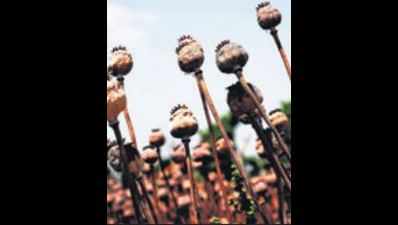- News
- City News
- jaipur News
- New policy gives big boost to opium cultivators in Rajasthan
Trending
This story is from October 23, 2016
New policy gives big boost to opium cultivators in Rajasthan
Diwali arrived early for the opium cultivators of Chittorgarh and Pratapgarh.

Estimates say that Rajasthan earns Rs 200 crore revenue every year from the opium fields.
JAIPUR: Diwali arrived early for the opium cultivators of Chittorgarh and Pratapgarh.
The recently notified rules for new opium policy 2016-17 of the Centre have paved the way for additional 15,000 to 18,000 licences for opium cultivation in the state.
In India, opium cultivation is prohibited under Section 8 of NDPS Act, 1985, except under a licence issued by Central Bureau of Narcotics.
At present, opium cultivation is permitted by Union government in selected tracts in three traditionally opium growing states - Rajasthan, Madhya Pradesh and Uttar Pradesh.
The rules have been relaxed considering the ‘de-licensed farmers’ on the basis of their average yield per hectare in last five years.
Experts are hoping that the new policy would add 30,000 farmers/fields to the opium growing states. The policy reads, “The government will consider issuing fresh licences to cultivators who had tendered total opium equal to more than 108% of the total minimum yield per hectare in last five years.”
The policy was notified on October 20.
Several hundred farmers in the last one decade have lost their licences as they failed to meet the target of per-hectare yield, which is a pre-condition to apply for a licence for the next year year.
The main reasons for poor opium crop are poor rains and weak winters.
Another reason is smuggling of opium from the fields to the international market where a farmer gets 100 times more revenue than what the government offers.
Last year, hailstorms had damaged the crop. Rajasthan is the biggest beneficiary of opium cultivation. Estimates say that state earns Rs 200 crore revenue every year from the opium fields. The new policy says that a minimum qualifying yield of 60 kg per hectare in Rajasthan and Madhya Pradesh must be tendered during the crop year 2016-17. The parameters set for the quality of opium are: morphine strength of opium should be less than 9% and ash content must be over 4.5%.
Another strict condition says that cultivators whose opium in 2016-17 is found to be adulterated or classified as ‘inferior’ by the Government Opium and Alkaloid Works at Neemuch will not be eligible for a licence in the next crop 2017-18. Upbeat over the new policy, farmers in Chittorgarh gave a warm welcome to C P Joshi, local MP, on Saturday who had lobbied hard for the relaxation in the policy. He said that several new villages have been identified for opium cultivation in the region.
The recently notified rules for new opium policy 2016-17 of the Centre have paved the way for additional 15,000 to 18,000 licences for opium cultivation in the state.
In India, opium cultivation is prohibited under Section 8 of NDPS Act, 1985, except under a licence issued by Central Bureau of Narcotics.
At present, opium cultivation is permitted by Union government in selected tracts in three traditionally opium growing states - Rajasthan, Madhya Pradesh and Uttar Pradesh.
Last year, Rajasthan, which is the highest opium producing state among the three, had around 21,000 licensed opium cultivators, which will now rise to over 35,000.
The rules have been relaxed considering the ‘de-licensed farmers’ on the basis of their average yield per hectare in last five years.
Experts are hoping that the new policy would add 30,000 farmers/fields to the opium growing states. The policy reads, “The government will consider issuing fresh licences to cultivators who had tendered total opium equal to more than 108% of the total minimum yield per hectare in last five years.”
The policy was notified on October 20.
Several hundred farmers in the last one decade have lost their licences as they failed to meet the target of per-hectare yield, which is a pre-condition to apply for a licence for the next year year.
The main reasons for poor opium crop are poor rains and weak winters.
Another reason is smuggling of opium from the fields to the international market where a farmer gets 100 times more revenue than what the government offers.
Last year, hailstorms had damaged the crop. Rajasthan is the biggest beneficiary of opium cultivation. Estimates say that state earns Rs 200 crore revenue every year from the opium fields. The new policy says that a minimum qualifying yield of 60 kg per hectare in Rajasthan and Madhya Pradesh must be tendered during the crop year 2016-17. The parameters set for the quality of opium are: morphine strength of opium should be less than 9% and ash content must be over 4.5%.
Another strict condition says that cultivators whose opium in 2016-17 is found to be adulterated or classified as ‘inferior’ by the Government Opium and Alkaloid Works at Neemuch will not be eligible for a licence in the next crop 2017-18. Upbeat over the new policy, farmers in Chittorgarh gave a warm welcome to C P Joshi, local MP, on Saturday who had lobbied hard for the relaxation in the policy. He said that several new villages have been identified for opium cultivation in the region.
End of Article
FOLLOW US ON SOCIAL MEDIA










